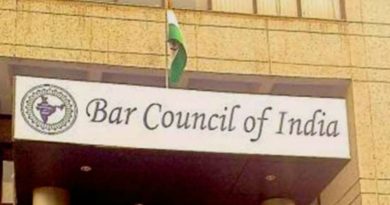Apex Court Orders Controversial Section 124A IPC To Keep In Abeyance; Asks Central & State Governments Not To Register New Cases Under That Section
Judicial Quest News Network)
In a historic and unprecedented order, the Apex Court on Wednesday put in Abeyance section 124A of IPC, known as Sedition law in common parlance till the Central Government reconsiders the provision.
A bench of Chief Justice of India NV Ramana and Justices Surya kant and Hima Kohli directed that proceedings under under section 124A IPC be kept in abeyance till the government’s exercise of reviewing Section 124A is complete.
The Court also directed the Central and state Government’s not to continue and restrain from registering any FIR, continuing any investigation or taking any coercive measures by invoking Section 124A of IPC while the aforesaid provision of law is under consideration.
“It is clear that the Union of India agrees with the prima facie opinion expressed by this Court that the rigors of Section 124A of IPC is not in tune with the current social milieu, and was intended for a time when this country was under the colonial regime. In light of the same, the Union of India may reconsider the aforesaid provision of law.”
It will be appropriate not to use this provision of law till further re-examination is over,. We hope and expect Central and state Government will refrain from registering any FIR, continuing investigation, or taking coercive steps under Section 124A IPC when it is being reconsidered by the Centre. The court ordered.
It is further ordered that If any fresh case is registered under Section 124A of IPC, the affected parties are at liberty to approach the concerned Courts for appropriate relief. The Courts are requested to examine the reliefs sought, taking into account the present order passed as well as the clear stand taken by the Union of India.
The court was hearing the batch of petitions challenging the validity of the law
Framed under Section 124A IPC, the sedition law states: 124A. Sedition.—Whoever by words, either spoken or written, or by signs, or by visible representation, or otherwise, brings or attempts to bring into hatred or contempt, or excites or attempts to excite disaffection towards, 13*** the Government established by law in 14[India], 15*** shall be punished with 16[imprisonment for life], to which fine may be added, or with imprisonment which may extend to three years, to which fine may be added, or with fine.”
The directions issued by the Apex Court are as follows
a. The interim stay granted in W.P.(Crl.)No.217/2021 along with W.P.(Crl.)No.216/2021 vide order dated 31.05.2021 shall continue to operate till further orders.
b. We hope and expect that the State and Central Governments will restrain from registering any FIR, continuing any investigation or taking any coercive measures by invoking Section 124A of IPC while the aforesaid provision of law is under consideration.
c. If any fresh case is registered under Section 124A of IPC, the affected parties are at liberty to approach the concerned Courts for appropriate relief. The Courts are requested to examine the reliefs sought, taking into account the present order passed as well as the clear stand taken by the Union of India.
d. All pending trials, appeals and proceedings with respect to the charge framed under Section 124A of IPC be kept in abeyance. Adjudication with respect to other Sections, if any, could proceed if the Courts are of the opinion that 5 no prejudice would be caused to the accused.
e. In addition to the above, the Union of India shall be at liberty to issue the Directive as proposed and placed before us, to the State Governments/Union Territories to prevent any misuse of Section 124A of IPC. f. The above directions may continue till further orders are passed.
This Court is cognizant of security interests and integrity of the State on one hand, and the civil liberties of citizens on the other. There is a requirement to balance both sets of considerations, which is a difficult exercise. The case of the petitioners is that this provision of law dates back to 1898, and pre-dates the Constitution itself, and is being misused. The Attorney General had also, on an earlier date of 4 hearing, given some instances of glaring misuse of this provision, like in the case of recital of the Hanuman Chalisa.The CJI said while dictating the order.
The main contention od the petitioner was if an adjournment was indeed granted, how the interests of people who are already booked under section 124A can be protected and if future cases can be kept abeyance till reconsideration is over. The Solicitor General has been asked to get instructions on this.
The Solicitor general of India Tushar Mehta informed the court that a proposed draft direction has been prepared to be issued by the Centre keeping in mind that a cognizable offence was committed, it may not be proper to stay the effect of provision either by the Centre or the Court.
Therefore the draft suggests selecting a responsible officer at the level of Superintendent of Police for Scrutiny before registering FIR, and his satisfaction is subject to judicial review.
SG has further submitted regarding the pending cases that some of these may have a ‘terror’ angle or involve money laundering. Ultimately he asserted that the pending cases were before a judicial forum and that we need s trust the courts.
The Central government earlier had submitted an affidavit in the court stating that it has decided to re-examine the section 124 A of the Indian Penal Code (IPC), which criminalises the offence of Sedition.
It had, therefore, asked the court to defer the hearing till the government takes a call.
It had, therefore, asked the Court to defer the hearing till the government takes a call.
The Solicitor general argued that it may not be the correct approach to pass other to stay the provisions upheld by a constitutional bench in any other cases.
He also highlighted that no individual accused under the impugned Section was before the Court in this case. It was argued that to entertain this PIL may be a dangerous precedent for that reason.
Senior Advocate Kapil Sibal objected to this proposal and asserted that this was wholly unacceptable.
Justice Kant pointed out that according to the Centre, the pre-registration FIR scrutiny was to go to the Superintendent of Police and asked who the petitioners preferred for the same as a fair and impartial authority to scrutinise registration of FIR.
Sibla replied to this and said that the FIR should not go to anybody and that it should be stayed at the first instance itself during the interregnum period.
Justice Kant pointed out that there was a subsequent development in the case and that the court was merely trying to explore a viable solution for the cases registered under the impugned section during the interregnum.
When the court asked how many petitioners were in jail at present. Senior Advocate CU Singh responded that the petitioner in one of the cases was produced by this court, refereeing to journalist Kishore Chand Wankhem.
Sibal had further mentioned that presently 13,000 individuals were in jail under the impugned provision.
Senior Advocate Gopal Sankarnarayan appearing for the petitioners submitted to the court a set of guide lines to be followed while urging the court to keep the operation of Section 124A in abeyance.
Case Title: S.G. Vombatkere vs Union of India (Wpc 682/2021) Editors Guild of India and Anr. Vs Union of India and Ors (WPC 552/2021)




